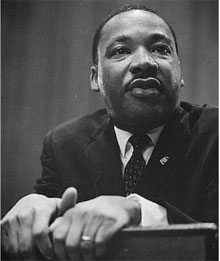 The 1955 Montgomery Bus Boycott which initiated the Civil Rights movement under Dr. King’s leadership was grounded in principles he internalized from biblical stories. The teachings of Mohandas Gandhi on nonviolence would come to play an important role in King’s approach, but “At the beginning of the boycott, King did not consciously apply Gandhian principles but depended almost solely on the love ethic of the Sermon on the Mount.” (Martin Luther King, Jr. for Armchair Theologians, Rufus Burrow, Jr., 2009, p. 79)
The 1955 Montgomery Bus Boycott which initiated the Civil Rights movement under Dr. King’s leadership was grounded in principles he internalized from biblical stories. The teachings of Mohandas Gandhi on nonviolence would come to play an important role in King’s approach, but “At the beginning of the boycott, King did not consciously apply Gandhian principles but depended almost solely on the love ethic of the Sermon on the Mount.” (Martin Luther King, Jr. for Armchair Theologians, Rufus Burrow, Jr., 2009, p. 79)
King’s thought and advocacy broadened in scope over the next ten years as his understanding of the connections between violence, justice, racism and poverty deepened. He saw that the principles of nonviolence as applied to the struggle for racial justice within our nation must also be applied to conflicts between nations: “If the world house God has provided for us is to have any chance of surviving, nonviolence as a way of life must be internationalized.” (Burrow, p.137)
In the mid-60’s, King began to speak out against the Viet Nam War, alienating both whites as well as blacks, who saw this as a distraction from issues of racial justice. His posthumous autobiography records his experience of this rejection:
When I first took my position against the war in Vietnam, almost every newspaper in the country criticized me. It was a low period in my life. I could hardly open a newspaper. It wasn’t only white people either; it was Negroes.
But then I remember a newsman coming to me one day and saying, “Dr. King, don’t you think you’re going to have to change your position now because so many people are criticizing you? And people who once had respect for you are going to lose respect for you. And you’re going to hurt the budget, I understand, of the Southern Christian Leadership Conference; people have cut off support. And don’t you think that you have to move now more in line with the [Johnson] administration’s policy?”
That was a good question, because he was asking me the question of whether I was going to think about what happens to me or what happens to truth and justice in this situation. (The Autobiography of Martin Luther King, Jr. edited by Clayborne Carson, 1998, p. 342)
Faced with a decision, King opted for what he called, “the path of Jesus Christ.” In the words of theological ethicist Rufus Burrow, “He had come home to principles that guided his ministry from the beginning: his convictions that Christianity is serious business and that the Christian’s ultimate allegiance is to God only.” (Burrow, p.135)
On April 4, 1967, exactly a year before his death, King addressed clergy at Riverside Church in New York City about “A Time to Break Silence.” He detailed sharp criticism of the Johnson administration war policies and specified concrete actions “to begin the long and difficult process of extricating ourselves from this nightmarish conflict.” (A Testament of Hope: The Essential Writings of Martin Luther King, Jr. edited by James Melvin Washington, 1986, p. 239)
Of even more significance than his critique of a specific military engagement was King’s call for adherence to Jesus’ vision of the Kingdom of God as he addressed the very nature of God’s design for humanity:
A genuine revolution of values means in the final analysis that our loyalties must become ecumenical rather than sectional. Every nation must now develop an overriding loyalty to [humankind] as a whole in order to preserve the best in their individual societies.
This call for a world-wide fellowship that lifts neighborly concern beyond one’s tribe, race, class and nation is in reality a call for an all-embracing and unconditional love for all [people]. This oft misunderstood and misinterpreted concept—so readily dismissed by the Neitzsches of the world as a weak and cowardly force—has now become an absolute necessity for the survival of [humanity].
When I speak of love I am not speaking of some sentimental and weak response. I am speaking of that force which all of the great religions have seen as the supreme unifying principle of life. Love is somehow the key that unlocks the door which leads to ultimate reality. This Hindu-Moslem-Christian-Jewish-Buddhist belief about ultimate reality is beautifully summed up in the first epistle of Saint John:
Let us love one another; for love is God and everyone that loveth is born of God and knoweth God. He that loveth not knoweth not God; for God is love. If we love one another God dwelleth in us, and his love is perfected in us.
Let us hope that this spirit will become the order of the day. We can no longer afford to worship the god of hate or bow before the altar of retaliation. The oceans of history are made turbulent by the ever-rising tides of hate.
History is cluttered with the wreckage of nations and individuals that pursued this self-defeating path of hate. As Arnold Toynbee says: “Love is the ultimate force that makes for the saving choice of life and good against the damning choice of death and evil. Therefore the first hope in our inventory must be the hope that love is going to have the last word.” (Washington, p. 242)
On Passion Sunday of 1968, King preached his last Sunday morning sermon, at the National Cathedral in Washington, DC. He described our world as a neighborhood in which we need to learn to live together as brothers and sisters. He warned us that if we did not “we will all perish together as fools” because God has created and structured the universe in such a way that “We are tied together in a single garment of destiny.” He proclaimed,
There comes a time when one must take the position that it is neither safe nor politic nor popular, but he must do it because conscience tells him it is right. I believe today that there is a need for all people of good will to come with a massive act of conscience and say in the world of the old Negro spiritual, “We ain’t goin’ study war no more.” This is the challenge facing modern [humanity].” (Washington, pp. 276-277)
A few days later, in Memphis, Tennessee on the eve of his assassination, King preached his final sermon: “I See the Promised Land.” He considered which age he would most like to live in and decided on the present—our digital, post-modern age, still in its infancy in 1968. One of the reasons he gave was that…
we have been forced to a point where we’re going to have to grapple with the problems that [people] have been trying to grapple with through history, but the demands didn’t force them to do it. Survival demands that we grapple with them. [People], for years now, have been talking about war and peace. But now, no longer can they just talk about it. It is no longer a choice between violence and nonviolence in this world; it’s nonviolence or nonexistence.” (Washington, p. 280)
Martin Luther King, Jr. was a faithful disciple of Jesus Christ and a mighty prophet of the Lord of Heaven and Earth. His words, acts, and powerful witness to Jesus’ way of peace are as relevant today as they were 50 years ago.


